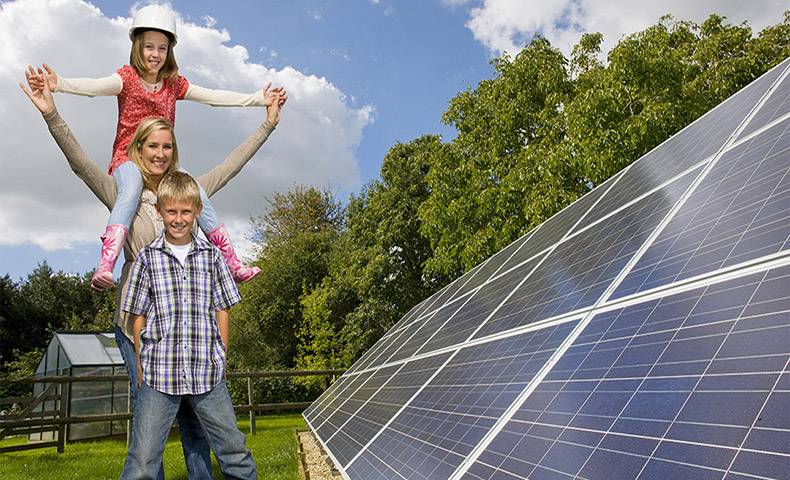
The decision by a homeowner to put solar panels on his roof or on a ground-mount on his property can sometimes lead to issues with his neighbors.
The Post-Star newspaper in Glens Falls, New York, recently delved into one of these scenarios.
A resident complained to the Town Board after a Queensbury man installed a large ground-supported solar array measuring 50 feet long and 16 feet tall that hovered within 3 feet of his property line.
“The neighbor called the large solar panel ‘obnoxious’,” reads the story.
Such situations are not uncommon as the solar industry sees record-breaking growth year after year. What might be a way for someone to lower his/her electric bill and carbon footprint might be an eyesore to his neighbor.
Are there legal restrictions for solar energy?
Legalmatch.com notes that “if you desire to install solar panels on your property you will be subject to certain rules and regulations. These requirements may vary between the states and even your Homeowner’s Association.”
The restrictions are particularly strong if you are part of a Homeowner’s Association (HOA). Many HOA’s will require that you submit paperwork that explains what you will be doing and how long the process will take.
However, due to growing popularity of solar power and legislation, like the Solar Rights Act, many HOA’s are not allowed to ban solar panels if you live in a state that has enacted a solar access law.
Still, issues do arise when people live in close proximity to another. Take a case brought on an Internet message board devoted to the topic of solar power. It dealt with a neighbor who complained of experiencing “high glare from about 5-8 panels for about 45 minutes per day” after a man installed panels on his roof. “ He expects me to have the panels relocated somewhere else on my roof so the glare goes away,” the posting read. “e threatened legal action if I don't comply.”
Some of the recommendations for him dealt with trying to diffuse the situation by planting trees that could block the glare coming from the solar panels. Others also mentioned paying for some window treatment on the neighbor’s home to shield him from the glare.
Blocking the sun
Another issue that may come up is when a neighbor’s home project blocks the sun that reaches your home solar energy system. Say, for instance, he decides to add a story to his home, plant a large tree in his hard or build a tall fence that sends shade to the entire solar array or part of it. Either way, it will impact how much power your panels produce, as they need direct sunlight to work at their maximum.
In such cases, writes Nolo.com, you might want to turn to an easement, or the right to use someone else’s land for a particular purpose.
Easements are often formal; they are recorded on the deed of a particular property, and publicly discoverable by future buyers.
Solar easement
In the case of photovoltaic (PV) modules, you’d want to get a solar easement. Which “restricts what your neighbor can build or grow on his property within his or her airspace, because the neighbor cannot block sunlight to your solar panels,” Nolo.com explains.
The agreement must be written and recorded with the county clerk in order to be legally binding, and should describe the property that will benefit from it and the one encumbered by it, describing specifically the angles that must remain open to sunlight. While you don’t necessarily need an attorney to draft it, it’s always a good idea to seek legal counsel.
According to the Department of Energy, a solar easement must include:
There is often compensation exchanged in an easement, explains Alpern Myers Stuart, a lawyer in Colorado.
“If you are paying your neighbor for the solar easement or you are providing your neighbor with a solar easement on your property in exchange for an easement on theirs, you will want to note the compensation terms in the instrument. There is no minimum or maximum amount of compensation for a solar easement, simply what all parties involved will agree upon.”
But before you reach these legal actions, experts recommend trying to solve the issue civilly. Sometimes fixing the problem can be as simple as talking to your neighbor and explaining the issue, coming to an agreement that benefits both parties. After all, chances are you will be neighbors for a long time.
HahaSmart Blog - More Solar Tips and Guide
HahaSmart News - Stay Informed
Your Solar Incentives - See Credits and Incentives in Your Area
Check Your Home's Solar Price - See How Much You Save
Register Now - Unlock The Lowest Solar Prices in Your Area


Input your address to see if it is solar friendly and how much you can save with solar.
Great. Your address is perfect for solar. Solar incentive is still available. Select monthly utility cost and calculate the size of solar system you will need now.
| kw System size | years Payback period | Lifetime savings |
No money down, 100% finance is available.
|
|
Check the price of solar panels in your area in a matter of seconds! |
Comments (1)
Those seeking solar easements should not expect a property owner to give up rights of building or growing on their own land simply because the “solar seeker” thinks their rights matter more. You’ve got what you’ve got to work with, so work within those parameters. You don’t always get 100% of what you want in life, so please don’t try to make your neighbor the bad guy just because they don’t want to perpetually encumber their property!